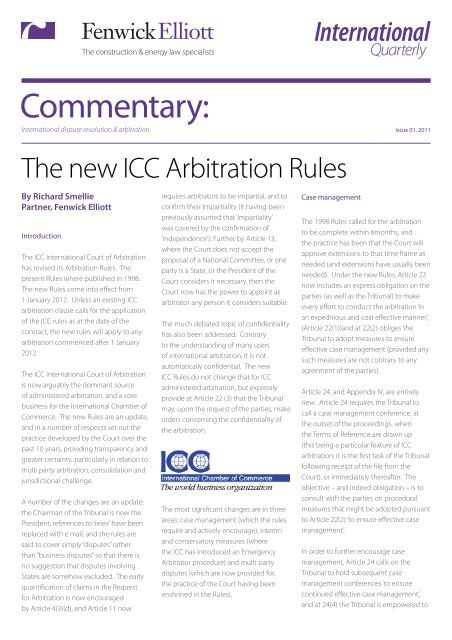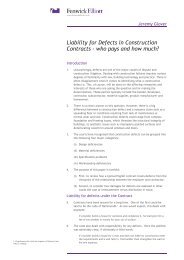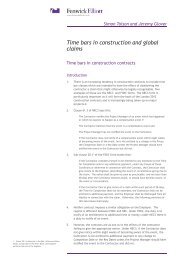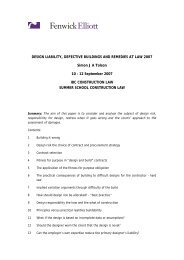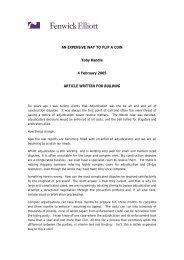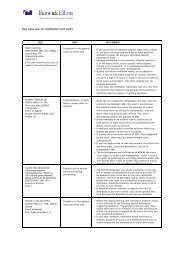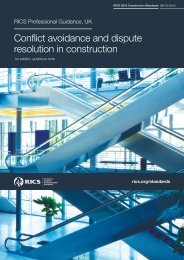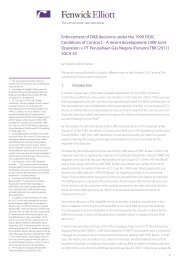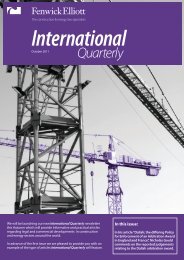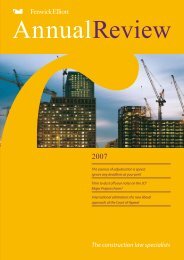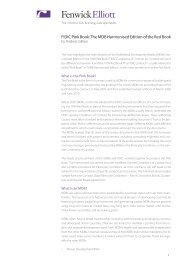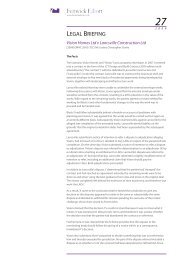Commentary:International dispute resolution & arbitration Issue 01, 2011The new ICC Arbitration RulesBy Richard SmelliePartner, <strong>Fenwick</strong> <strong>Elliott</strong>IntroductionThe ICC International Court of Arbitrationhas revised its Arbitration Rules. Thepresent Rules where published in 1998.The new Rules come into effect from1 January 2012. Unless an existing ICCarbitration clause calls for the applicationof the ICC rules as at the date of thecontract, the new rules will apply to anyarbitration commenced after 1 January2012.The ICC International Court of Arbitrationis now arguably the dominant sourceof administered arbitration, and a corebusiness for the International Chamber ofCommerce. The new Rules are an update,and in a number of respects set out thepractice developed by the Court over thepast 10 years, providing transparency andgreater certainty, particularly in relation tomulti party arbitration, consolidation andjurisdictional challenge.A number of the changes are an update:the Chairman of the Tribunal is now thePresident, references to ‘telex’ have beenreplaced with e mail, and the rules aresaid to cover simply “disputes” ratherthan “business disputes” so that there isno suggestion that disputes involvingStates are somehow excluded. The earlyquantification of claims in the Requestfor Arbitration is now encouragedby Article 4(3)(d), and Article 11 nowrequires arbitrators to be impartial, and toconfirm their impartiality (it having beenpreviously assumed that ‘impartiality’was covered by the confirmation of‘independence’). Further by Article 13,where the Court does not accept theproposal of a National Committee, or oneparty is a State, or the President of theCourt considers it necessary, then theCourt now has the power to appoint asarbitrator any person it considers suitable.The much debated topic of confidentialityhas also been addressed. Contraryto the understanding of many usersof international arbitration, it is notautomatically confidential. The newICC Rules do not change that for ICCadministered arbitration, but expresslyprovide at Article 22 (3) that the Tribunalmay, upon the request of the parties, makeorders concerning the confidentiality ofthe arbitration.The most significant changes are in threeareas: case management (which the rulesrequire and actively encourage), interimand conservatory measures (wherethe ICC has introduced an EmergencyArbitrator procedure) and multi partydisputes (which are now provided for,the practice of the Court having beenenshrined in the Rules).Case managementThe 1998 Rules called for the arbitrationto be complete within 6months, andthe practice has been that the Court willapprove extensions to that time frame asneeded (and extensions have usually beenneeded). Under the new Rules, Article 22now includes an express obligation on theparties (as well as the Tribunal) to makeevery effort to conduct the arbitration ‘inan expeditious and cost effective manner’,(Article 22(1))and at 22(2) obliges theTribunal to adopt measures to ensureeffective case management (provided anysuch measures are not contrary to anyagreement of the parties).Article 24, and Appendix IV, are entirelynew. Article 24 requires the Tribunal tocall a case management conference, atthe outset of the proceedings, whenthe Terms of Reference are drawn up(this being a particular feature of ICCarbitration: it is the first task of the Tribunalfollowing receipt of the file from theCourt), or immediately thereafter. Theobjective – and indeed obligation – is toconsult with the parties on proceduralmeasures that might be adopted pursuantto Article 22(2) ‘to ensure effective casemanagement’.In order to further encourage casemanagement, Article 24 calls on theTribunal to hold subsequent casemanagement conferences ‘to ensurecontinued effective case management’,and at 24(4) the Tribunal is empowered to
Commentary:International dispute resolution & arbitration Issue 01, 2011request the attendance of a partyrepresentative at a case managementconference, the intention being to securethe parties ‘buy in’ to effective casemanagement procedures.Appendix IV provides examples of casemanagement techniques that might beadopted. None of the proposals in thisappendix are in themselves radical, butthe appendix provides a useful list ofpossible case management techniques.The list includes various proposals aimedat limiting disclosure, and looking forareas where the parties or their expertsmight agree, limiting the length ofwritten submissions and evidence, andlooking at bifurcation, the use of IT, andgiving consideration to whether thereare issues that might be decided on adocuments only basis. It also includesencouragement to the parties to considersettlement.The case management provisionsconclude at Article 27, where a newobligation is placed upon the Tribunal: atthe conclusion of the proceedings, whenthe Tribunal declares the proceedingsclosed, the Tribunal must now also informthe Secretariat and the parties of the dateby which the Tribunal expects to submitits draft award to the Court for approval.Emergency ArbitratorWhilst the 1998 Rules made provisionfor the issue of interim or conservatorymeasures by the Tribunal onceestablished, they did not provide amechanism for urgent applicationpending the Tribunal being constituted.Consequently parties with an ICCarbitration clause would have to lookto local courts for any urgent interim orconservatory measures, or wait for theTribunal to be constituted – a process thatcould take several months.The new Rules however now provide,at Article 29 and Appendix 5, for theappointment of an Emergency Arbitratorto make orders for urgent interim orconservatory measures, a procedure thathas been included in a number of otheradministered arbitral rules (the SIAC andStockholm rules being examples).Appointment of the Emergency Arbitratoris made upon request to the Secretariat(Article 29(1)). The request must be madebefore the transmission of the file to theTribunal if a Request for Arbitration hasalready been lodged. The appointmentis made by the President of the ICC Court,who also decides whether the emergencyprovisions apply. Further the fee ($40,000)must be paid before the application willbe notified to the Parties under AppendixIV Article 2, and the emergency procedurecommenced.The Emergency Arbitrator must act fairyand impartially, and allow each partyreasonable opportunity to present its case(Appendix IV, Article 5 (2)). By Appendix IV,Article 6(4) the Emergency Arbitrator mustsend his order to the Parties within 15days from the date the file is transmittedto him, and the date of transmissionis expected to be on the emergencyarbitrators appointment, which shouldbe within two days of the request for theappointment having been made (2(1)).If a Request for Arbitration has notalready been made by the partyseeking the urgent interim relief, thatRequest must be made within 10 daysof making application, failing which thePresident must terminate the emergencyproceedings (Appendix IV, Article 1 (6)).It is important to note that by Article 29(2),the emergency arbitrator’s decision takesthe form of an order, and not an award,and by Article 29(3) does not bind theTribunal ultimately established to resolvethe dispute. It is not therefore in thenature of a final, binding decision of anarbitrator, with the result that it is unlikelyto be enforceable as an arbitrator’s award.Its “teeth” however, are found in the powergiven at Article 29(4) to the Tribunalappointed to determine the dispute,to decide upon any claims relating tothe emergency arbitrator proceedings.Noncompliance with an emergencyarbitrator’s order could, therefore, result ina claim.It is also important to note that the Partiesare expressly given the option to opt-outof these provisions. As arbitration is aprocess born of contract, parties could, byagreement, say that any particular parts ofthe Rules do not apply, but if that includedrules which the ICC Court considersfundamental to ICC arbitration, then theICC Court would decline to administerthe arbitration. Whether the emergencyarbitrator procedure might be regarded asfundamental is not known, but the Partieshave been given the express right to optout should they so choose.Further, by Article 29(6), these provisionswill not apply to arbitration agreementsentered onto before 1 January 2012,and by Article 29(7), it is not intended toprevent a party applying to local courts forinterim or conservatory relief.


